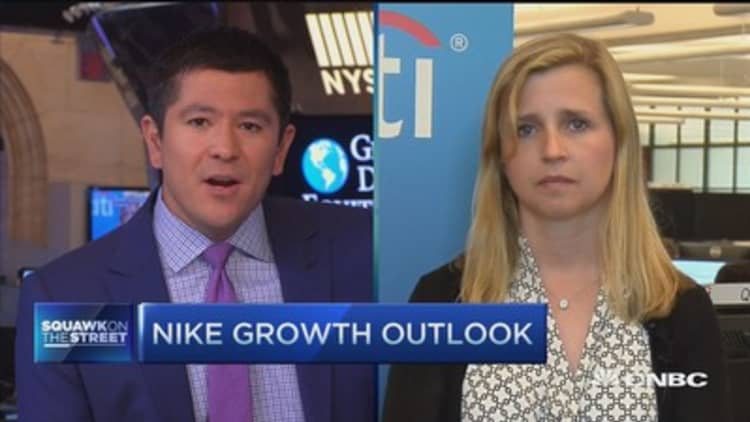
The NBA Finals are shaping up to be a heart-stopping showdown between the Cleveland Cavaliers and the Golden State Warriors, especially with Game 4 on Thursday night. For the teams' two top stars, LeBron James and Stephen Curry, there's also ongoing competition to score lucrative sponsorship deals.
While James is the clear winner for now—Forbes has his endorsements pegged at $44 million annually—Curry is an up-and-comer, especially thanks to his 2015 NBA MVP award, recently inking deals with companies such as Under Armour and State Farm.
"Sports and athletes are passion points for consumers," said Kevin Collins, senior vice president of sports investment for Magna Global, the strategic media arm of IPG Mediabrands. "There needs to be a good connection between the athlete and the brand, and it needs to be relevant to fans."
Read More LeBron's big season boosts Cavaliers and Cleveland itself
A Nielsen Talent Analytics team polled more than 1,000 Americans to determine fan allegiances. Overall, 65 percent and 53 percent of survey takers considered James and Curry to be successful athletes, respectively.
To give a further a glimpse into whether that star athlete power may be able to drive sales, Nielsen pried further into expected consumer behaviors over the next year. Question topics were based on James' and Curry's existing sponsorship deals. For example, the participants were asked about purchasing carbonated beverages because of James' Sprite deal, while a deodorant question was prompted by Curry's Degree sponsorship.
"The value that a star athlete like James or Curry can bring to a brand is undeniable," Stephen Master, Nielsen's global senior vice president of sports, said in a release. "But proving the actual ROI of that relationship and truly maximizing that investment is still somewhat of a challenge for marketers. Having a deep understanding of an athlete's fans—what they're actually watching, buying and listening to—means having the ability to make smarter marketing decisions."
Read MoreAs NBA Finals start, Warriors fight claims of ticket monopoly
Looking back on the deodorant question, Curry fans were 16 percent more likely to buy the product in the next year compared to the general U.S. population.
When the same question was asked to fans of James, who currently doesn't have a deodorant deal, they didn't smell so bad, either. They were 12 percent more likely to buy the personal hygiene product over the next 12 months when looking at the average American, perhaps sniffing out a potential marketing win for deodorant brand.
Fans of James, who is sponsored by Kia's K900, were also 26 percent more likely to buy a full-size car, showing that the auto manufacturer might have made the right choice in picking the Cavaliers star.
Both sets of fans were also about 30 percent more likely to switch their wireless carrier over the next year compared to the average American. With James already having inked a Verizon and a Samsung Galaxy deal, it could mean marketers who decide to work with Curry could see some boost.
See more stats below:
But Express, which backs Curry, may have been better off going with James. The Golden State Warrior player's fans were less likely to buy men's business clothing over the next year than James' fans.
Surprisingly, considering that soft drinks tend to be a big source of sponsorship, James' fans were 3 percent less likely to buy carbonated beverages compared with the general population.
Before soft drink marketers decide to pull their dollars, Nielsen representatives pointed out with glass half-full optimism that the lack of interest may be a lucrative marketing opportunities. It could be an chance to boost soft drink purchases, thanks to the backing of a household name. They also point out that this study looked at broad categories, so it's not clear to say that James fans are less likely to buy a particular brand of carbonated beverage, say Sprite.
Still, Collins said that it's important for brands to note that the intended purpose of the product should reflect the sponsorship opportunity. For example, Coors Light, which is a Magna Global client, presents the Coors Light Cold Hard Facts for the NHL. Collins said it fits in with the brand messaging that Coors is one of the coldest beers around. However, he was a little puzzled by the ESPN Budweiser Hot Seat, since hot beer doesn't tend to bring up positive connotations.
Collins added that marketers should also consider that no matter how popular the star, using them to back your company can backfire if the product has nothing to do with the image the athlete portrays. Although Michael Jordan is still one of the most revered athletes of all time, Collins said he had a couple of head-scratching deals, including his shilling for Rayovac batteries.
There's also the infamous Sega game Shaq Fu, which was widely regarded as one of the worst fighting games of all time.
"You want there to be some synergy between (the athlete) and his brand," he said. "You don't just want to splat your logo up there."


